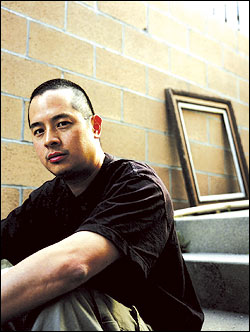JUST ABOUT EVERYTHING concerning Robin Williams’ newest family film, set in “the near future,” is heartwarming. Its length, for example: 132 minutes is a good, comfortable amount of time to allow its humane, sub-epic pretensions to sink in fully—even if you can guess the entire plot in the first 60 seconds. And its marketing tagline also promises uplift, hard-selling a fable of “One robot’s 200-year journey to become an ordinary man.”
BICENTENNIAL MAN
directed by Chris Columbus
with Robin Williams, Sam Neill, Oliver Platt, and Embeth Davidtz
opens December 17 at Pacific Place
Of course, Williams’ robot (Andrew) not only wants to become human, he is human underneath the wires and metal encasement. There’s nothing mechanical about him, from the minute he steps out of a box and scares the rich family that owns him shitless by projecting Jenny Holzer-like visuals advertising his robo-capabilities. Even at his most somnambulant, Williams radiates something—not necessarily life, but a twitchy restlessness that comes through his stiff robot motions. But his mechanisms aren’t the only clunky thing about Bicentennial Man. Apart from a rebellious elder daughter (who somehow grows up to be a bitter old woman), Andrew’s other owners have proverbial hearts of gold, particularly patriarch Sir (Sam Neill) and younger daughter Little Miss, played by Hallie Kate Eisenberg as a girl and Embeth Davidtz as a woman. (This being a fable, we’re not given characters with names, but archetypes with labels.)
Sir, sensing Andrew’s extraordinary capabilities, teaches him the ways of human beings—humor, sex, and the like. Eventually, Andrew decides he wants his freedom and makes a 200-year quest to seek out his own kind: Other robots that share his prehensile emotions. His search leads him—you guessed it—back home, where a scientist (Oliver Platt) gradually transforms him into a sentient being full-fledged enough to eventually marry Little Miss’ dead-ringer granddaughter (Davidtz again) and fight for his right to be legally declared a human.
So, is your heart warm yet? Huh? If not, that’s because you’ve only read a plot summary and don’t have James Horner’s treacly soundtrack or the sentimental script (based on Isaac Asimov’s 1976 story “The Positronic Man”) to build that fire and turn you to jelly. To get the full effect, you’ll have to hear dialogue like Platt’s “Welcome to the human condition,” and Andrew’s “I would rather die like a man than live for all eternity as a machine.” Excruciating? Maybe. But apparently that’s what Hollywood requires to warm the hearts of the masses.








